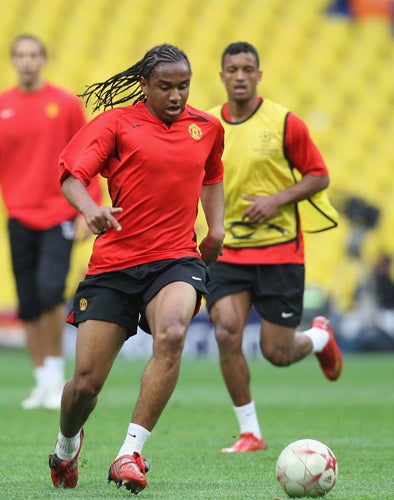The boys from Brazil are nuts about North-west

Your support helps us to tell the story
From reproductive rights to climate change to Big Tech, The Independent is on the ground when the story is developing. Whether it's investigating the financials of Elon Musk's pro-Trump PAC or producing our latest documentary, 'The A Word', which shines a light on the American women fighting for reproductive rights, we know how important it is to parse out the facts from the messaging.
At such a critical moment in US history, we need reporters on the ground. Your donation allows us to keep sending journalists to speak to both sides of the story.
The Independent is trusted by Americans across the entire political spectrum. And unlike many other quality news outlets, we choose not to lock Americans out of our reporting and analysis with paywalls. We believe quality journalism should be available to everyone, paid for by those who can afford it.
Your support makes all the difference.They are used to socialising in Lancashire, but this weekend the get-together will be in San Cristobal, Venezuela, and then nearer home in Rio, before returning to the rigours of the Premier League. Once, pioneering Brazilian imports gravitated to North-east England; these days the new wave are to be found in the North-west.
Liverpool's Lucas Leiva ticks them off, starting with his club-mates: "Fabio [Aurelio] and Diego [Cavalieri], Robinho, Jo, Elano, Geovanni and everybody." He forgets – or ignores – the Manchester United contingent of Anderson and the Da Silva twins, but it is admittedly difficult keeping up. English football is at last dancing to the samba beat.
Chileans arrived in the 1940s, and Argentinians immediately after the World Cup win of 1978. Yet it was not until 1987 that a genuine Brazilian played here, and so limited was Francisco Mirandinha's impact at Newcastle that no compatriots would follow until 1995.
If the stocky centre-forward's transfer from Palmeiras for £575,000 after scoring his only international goal, against England, caused a stir, Juninho's move to Middlesbrough eight years later was a sensation. Here was a top-class Brazilian who became one of the club's most popular players in three spells there. Emerson, Branco (two games) and Fabio (one) may have been less successful on Teesside, but Juninho proved to his countrymen and their agents that a slight, ball-playing midfielder could survive amid the clogging and permissive refereeing.
By the turn of the century, Arsenal's Edu, Silvinho and Gilberto Silva were discovering the delights of London, and although it is now the North-west that is in vogue, all positions on the field are represented. Lucas, signed as Brazil's Under-20 captain, has found it understandably difficult to break into the Liverpool midfield but he is highly regarded by Rafa Benitez as a squad player. The same applies to the left-back Fabio Aurelio. The goal-keeper Cavalieri has to wait for his chance behind Pepe Reina.
"Maybe 10 years ago you didn't see so many Brazilians playing in England," says Lucas, "but now Brazilian players are adapting much better. The Premier League is the best league in the world, so it's normal that the players want to come and try to make a new story."
Sven Goran Eriksson, having assembled a new team in no time after taking over at Manchester City 15 months ago, went for the type of Brazilian player that English fans tend to admire most in the gifted midfielders Elano and Geovanni. The decision to release Geovanni after Eriksson had been sacked offered an opportunity for Hull City, whose manager, Phil Brown, could hardly credit his good fortune. "What I saw was a player who didn't get a fair crack of the whip at Manchester City," he says. "When I saw he'd got a 'free' I could not believe it. He gives us something that we didn't have before."
Stunning goals against Fulham, Arsenal and Tottenham illustrated what the missing factor was, as well as symbolising the English fan's view of what a Brazilian footballer should be all about. The most expensive of the lot, Robinho, comes into that category and should be able to integrate with his compatriot Jo, a prolific scorer with CSKA Moscow. At United, Anderson has exhibited more durable qualities to go with natural flair, and Rafael of the Da Silva twins made an excellent impression when he started for United at right-back against Middlesbrough and Aalborg.
"We try to make a Brazilian colony and we have meals every week," Lucas says of the happy band of brothers. "We are close and Manchester is only 40 minutes away. Normally we meet at someone's home and we speak Portuguese. We have the special food from Brazil – rice, beans and eggs with meat – but we eat everything. The wives make the food and we just speak about football. I'm in my second season already and I'm feeling at home. Maybe in another 10 years we will see even more Brazilians and we will have a great history in England."
This week, national pride is on their mind: Lucas, Elano, Jo, Robinho and Anderson are involved in important World Cup ties away to Venezuela today and at home to Colombia on Wednesday. Brazil have won only three games out of eight and are ahead of their perennial rivals Argentina by just one goal. No invitation, then, for Javier Mascherano to the samba soirées up the East Lancs Road.
Join our commenting forum
Join thought-provoking conversations, follow other Independent readers and see their replies
Comments